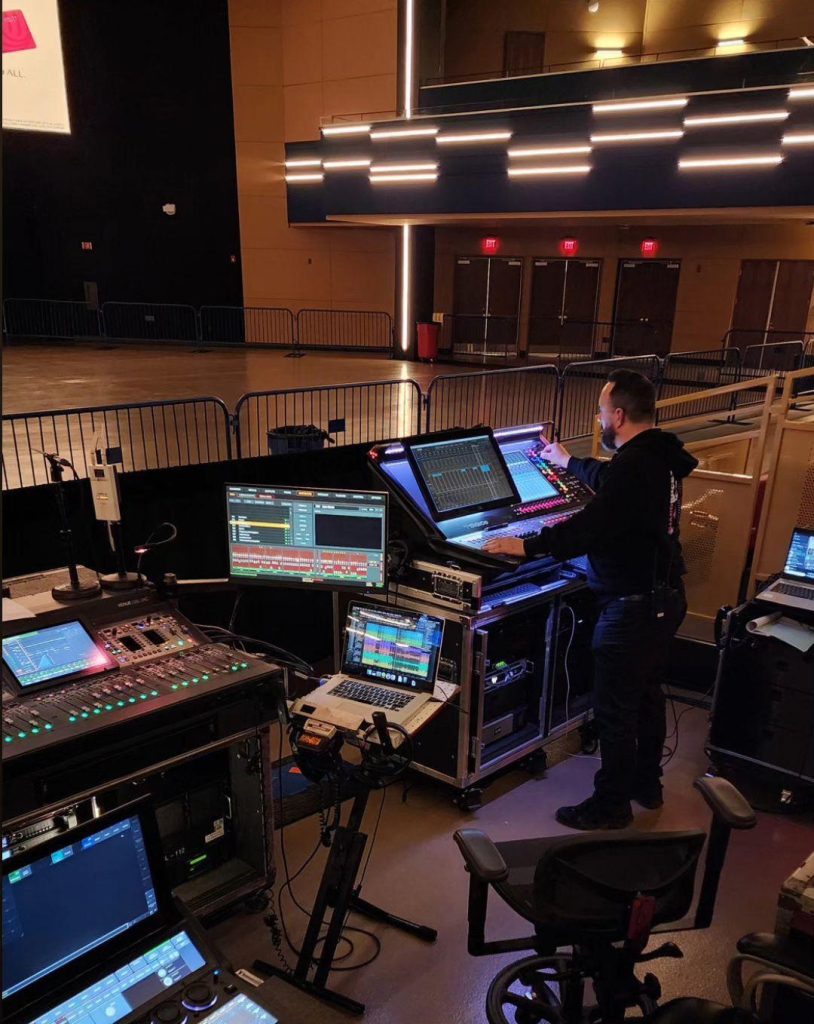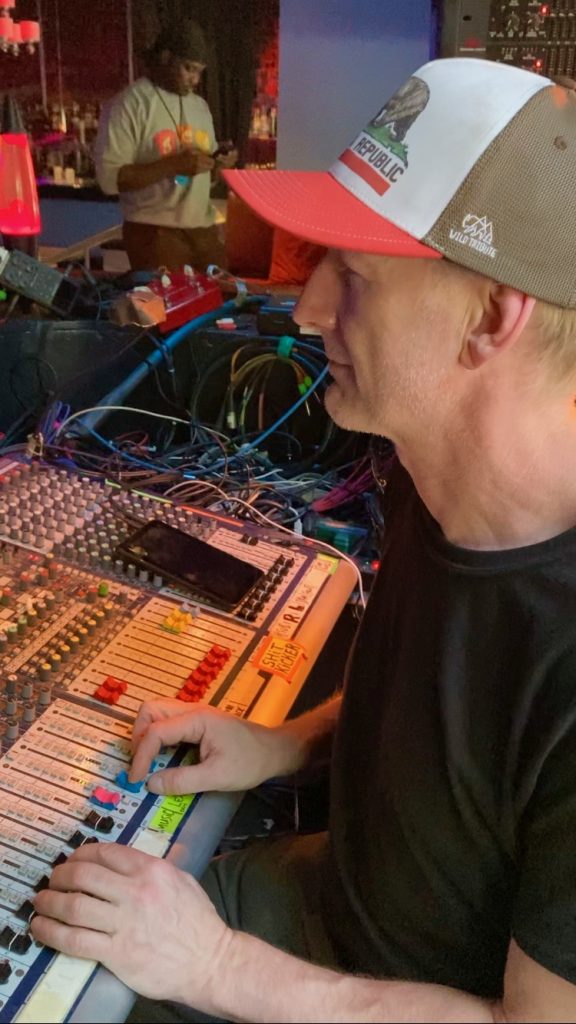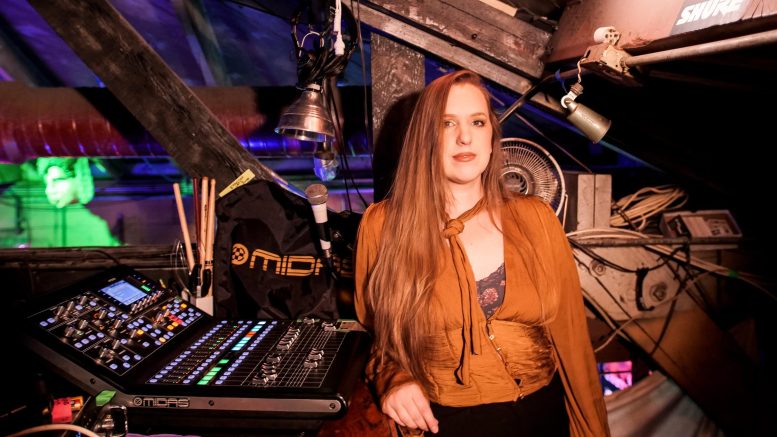How audio masters keep the beat for the city’s live entertainment
By Eddie Jorgensen
Jeremy Ayala, an audio engineer who runs the sound boards at Hard Rock Live Sacramento, caught his first break in the industry when an audio engineer quit unexpectedly during the set-up of a blues show at Musikfest in Bethlehem, Pennsylvania. That was back in 1995.
“The owner [of a local sound company] hired me to mix a couple sets each afternoon so the front of house guy there could get a proper meal break,” Ayala said. “It was a perfect situation to get my feet wet.”
While being an audio engineer can be one of the higher paying jobs in the entertainment industry, it can also be a thankless and trying vocation — often with a steep learning curve. It’s the sound engineer’s job to deal with any myriad of problems that come with live shows as well as hear critiques by concertgoers who, for the most part, have little insight into handling a live mix.
Getting Through the Door

One important element to becoming an audio professional is where and how one learns the craft. Ayala got his start locally. Taking inspiration from a high school class taught by the late Larry Shumate — dubbed the patriarch of Sacramento State University’s theater department — Ayala said he went on to spend the next couple of years in Sacramento City College’s theater arts program learning the ins and outs of stagecraft.
Some sound professionals get their training through hands-on experience. Rebeca Sleeth, who has handled audio duties at the Powerhouse Pub in Folsom since 2018, recalls that her own initiation into sound engineering was much different.
“My formal training was more like an immersive mentorship under the guidance of my then-boyfriend, now-husband,” she said, adding that he was an audio tech for the Sacramento Kings at the time and helped coach her through an entry role at Powerhouse Pub.
Sleeth said the duo soon realized the demand for sound engineers — possibly in part to the return of programming after pandemic shutdowns — after getting inundated with last-minute calls from various Sacramento venues in need of sound people. Now, they are in the early stages of developing their own sound engineering business, Sacramento Sound Solutions.
John Taylor, who keeps the shows sounding pristine at Harlow’s main room in Sacramento, had a completely different point of entry: He was self-taught. He had also been a drummer for several years before turning to a sound job in 1991. “Being in these cover bands, you had to have your own PA system,” he said.
Ayala notes there’s an array of options to learn the trade, particularly becoming an intern in a working studio or opting to work an entry role at a sound company. “You’ll learn the nuts and bolts of how the systems go together,” he said.
Sleeth thinks fear about getting into the business is normal. “If you’re first starting out, those huge bands with gear you’ve never mic’d or worked with or long input lists and stage plots can be intimidating,” she admitted. “You have to take it one step at a time.
For Harlow’s longtime soundman, Taylor, it’s as simple as stepping forward and raising your hand. “I would say go to your local club and offer yourself as an intern to start,” he said. “You could also go to a band and offer yourself. Both will work. This industry always needs fill-in engineers. And I could always use a break.”
Sounding Off

For many sound engineers, the first time running sound in a live situation can be daunting.
“I do recall the fear of mixing a gig alone when the time finally came,” Sleeth said of her first gig. “There’s a level of behind-the-stage fright, which most people don’t understand. If the engineer doesn’t show up, the show doesn’t happen.”
Part of the sound engineer’s job also means adapting to newer equipment, sometimes at a moment’s notice. Ayala points out that “digital boards are all about learning the navigation” of what a particular manufacturer has done to essentially allow the same commands. Essentially, all mixing boards require some adaptation.
Sleeth agrees, though notes there are generally workarounds one learns to take advantage of. “As long as you have a wi-fi connection, the Mixing Station app will transform your phone or tablet into a user interface that stays constant across various brands,” she said. Apps like one Sleeth uses help make the job easier — employing familiarity to command a sound board, regardless of the make or model.
Taylor prefers doing sound the old-school way, by having simple verbal communication with the house employees. “If you are on tour and they have a house sound guy, you just pump him for as much information as you can,” Taylor said. “Because many of the things at the club might not be working correctly.”
Most sound engineers, once they have a homebase, opt to stay local for personal and financial reasons. Ayala currently has no plans to tour until his children are out of high school, still a handful of years away.
For Sleeth, the negative side of touring keeps her away from the road. “I see touring engineers for small bands come through constantly,” she said. “They’re using house gear, sometimes hating their jobs because they have to figure out different systems each night.”
And there are some sound professionals who just like staying put for different reasons. In Taylor’s case, an unabashed cat lover, his large feline brood keeps him local.
This story is part of the Solving Sacramento journalism collaborative. Solving Sacramento is supported by funding from the James Irvine Foundation and Solutions Journalism Network. Our partners include California Groundbreakers, Capital Public Radio, Outword, Russian America Media, Sacramento Business Journal, Sacramento News & Review, Sacramento Observer and Univision 19.


Be the first to comment on "So, you wanna be a Sacramento sound engineer?"